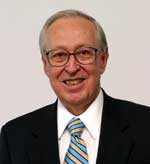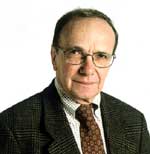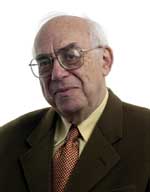November 10th marks the day of Atatürk's
death in 1938. To commemorate his life and legacy, Bilkent News asked three Bilkent
professors to reflect on Atatürk's life and consider what he might say about the state of
the world and Turkey today.
Bilkent News: Thinking about Atatürk's personality and his perspective
on life, if Atatürk was a 20-year old who studied at Bilkent University, what type of
extracurricular activities would he be participating in for the purpose of improving his
intellectuality?
 Prof.
Talat Halman: Chances are he would have attended most of the important lectures
organized by student associations here. Prof.
Talat Halman: Chances are he would have attended most of the important lectures
organized by student associations here.
It is always a pity that some of the most brilliant students never attend the public
lectures organized by Bilkent. Certainly Atatürk would have never missed a lecture on
philosophy, on political science, on international relations, or on culture and
literature. He had an active interest in topics ranging from literature to mathematics. I
am sure he would have been quite interested in extracurricular activities related to
positive sciences, possibly even engineering, because he was a creative genius who
possessed an intellectual curiosity of a most impressive type. We know very little about
him in terms of his intellectual inclinations at age twenty, but we can make such an
assumption judging by his later life, and knowing about most of the books he read. It is
amazing how carefully and how studiously he read those books, making comments in the
margins and underlining things that he found to be very interesting or important.
I would say that as a Bilkent undergraduate, he would have pursued his diverse interests.
He would not have been an 'inek' student. Whatever he happened to be studying, economics
or business administration or something else, he would have read far beyond the limits of
that particular academic discipline.
Bilkent News: Throughout his life, with his own words and actions,
Atatürk has underlined the importance of certain concepts and values such as cultural
development, scientific progress, modernity and progress in civilization. He always
emphasized the significance of the preservation and improvement of these concepts and
values for the future of our country. In your opinion, how attached are we now, to his
opinions of these values and concepts? How successful are we in terms of sticking to his
policies in such issues? What else can we do?
 Prof.
Metin Heper: Mustafa Kemal Atatürk's views have always been a source of great
inspiration for the people of Turkey, as well as for others elsewhere. In the 1920s,
Atatürk started a cultural revolution in Turkey, trying to enable the Turks to use their
own reasoning faculties when making decisions rather than turning to sacred books and/or
masters of different kinds. His efforts were focused on instructing his compatriots in how
to think rather than what to think. Atatürk set only certain general goals for the Turks
such as 'catching up with the contemporary civilization and, if possible, surpassing it.'
He pointed out that the truest guide in life was science. It follows that when Atatürk
said, "One should not mourn great men who passed away, but one should always keep in
mind what they counseled us," he was not telling us to adopt intact the particular
policies that Atatürk himself, for instance, had pursued at certain times and under
particular sets of circumstances. Rather, he was advising us to come up with policies
appropriate for our times and for the sets of circumstances under which we were going to
operate. In the last analysis, what is often called Atatürkism (Atatürkçülük) should
be perceived as rationalism (akılcılık). Keeping in mind what Atatürk counseled means
thinking and acting in a rational manner, that is, thinking and acting with a view to the
particular requirements and constraints of our times. We should not forget that in the
civics books of the Atatürk era, one does not come across the word, 'Kemalism,' nor the
word, 'Atatürkism.' Prof.
Metin Heper: Mustafa Kemal Atatürk's views have always been a source of great
inspiration for the people of Turkey, as well as for others elsewhere. In the 1920s,
Atatürk started a cultural revolution in Turkey, trying to enable the Turks to use their
own reasoning faculties when making decisions rather than turning to sacred books and/or
masters of different kinds. His efforts were focused on instructing his compatriots in how
to think rather than what to think. Atatürk set only certain general goals for the Turks
such as 'catching up with the contemporary civilization and, if possible, surpassing it.'
He pointed out that the truest guide in life was science. It follows that when Atatürk
said, "One should not mourn great men who passed away, but one should always keep in
mind what they counseled us," he was not telling us to adopt intact the particular
policies that Atatürk himself, for instance, had pursued at certain times and under
particular sets of circumstances. Rather, he was advising us to come up with policies
appropriate for our times and for the sets of circumstances under which we were going to
operate. In the last analysis, what is often called Atatürkism (Atatürkçülük) should
be perceived as rationalism (akılcılık). Keeping in mind what Atatürk counseled means
thinking and acting in a rational manner, that is, thinking and acting with a view to the
particular requirements and constraints of our times. We should not forget that in the
civics books of the Atatürk era, one does not come across the word, 'Kemalism,' nor the
word, 'Atatürkism.'
Bilkent News: Through his life, Atatürk made numerous reforms, headed
revolutions and brought innovations as he aimed to maintain continual progress in the
Turkish Republic. If he were still alive, what would he be willing to change in Turkey now
in the year 2006, in terms of public, politics, culture etc.?
 Prof.
Stanford Shaw: First of all, I would point out that a lot of people today say
things like, "we will only do what Atatürk wanted to do" and "What
Atatürk did, we will do the same; we won't change." But Atatürk, as a matter of
fact would never say that. Atatürk was a man who changed things. He didn't imitate what
people before him had done. He did new things to fit the needs of the Turkish Republic for
the modern world at that time and I think that if Atatürk came today he wouldn't just
imitate what Atatürk did in the 1920s and 1930s. He would say just as he said then: We
have to meet the conditions of the modern world as it is. Therefore he would change all
sorts of things. I think one thing he would do is to make Turkey even more democratic than
it is now. Now, it is difficult to accuse government officials of wrongdoing or influence
what government officials do. I think he would insist that government officials be
responsible for what they do and listen to what their constituents want before voting or
acting. I think he would lessen the power of the leaders of the different parties, because
the parties now dictate to their followers what they are supposed to do and how they are
supposed to vote in parliament. I think Atatürk would see that Turkey is far more mature
than it was in the 1920s and therefore if you are going to have a real democracy you have
to let the democratically elected politicians think for themselves and listen to the
people and not simply follow the dictatorship of their political leaders. Atatürk would
also provide Turkish citizens with more ways of expressing their own ideas and problems
and influencing what the Turkish political leaders do in their name. Prof.
Stanford Shaw: First of all, I would point out that a lot of people today say
things like, "we will only do what Atatürk wanted to do" and "What
Atatürk did, we will do the same; we won't change." But Atatürk, as a matter of
fact would never say that. Atatürk was a man who changed things. He didn't imitate what
people before him had done. He did new things to fit the needs of the Turkish Republic for
the modern world at that time and I think that if Atatürk came today he wouldn't just
imitate what Atatürk did in the 1920s and 1930s. He would say just as he said then: We
have to meet the conditions of the modern world as it is. Therefore he would change all
sorts of things. I think one thing he would do is to make Turkey even more democratic than
it is now. Now, it is difficult to accuse government officials of wrongdoing or influence
what government officials do. I think he would insist that government officials be
responsible for what they do and listen to what their constituents want before voting or
acting. I think he would lessen the power of the leaders of the different parties, because
the parties now dictate to their followers what they are supposed to do and how they are
supposed to vote in parliament. I think Atatürk would see that Turkey is far more mature
than it was in the 1920s and therefore if you are going to have a real democracy you have
to let the democratically elected politicians think for themselves and listen to the
people and not simply follow the dictatorship of their political leaders. Atatürk would
also provide Turkish citizens with more ways of expressing their own ideas and problems
and influencing what the Turkish political leaders do in their name.
Atatürk would try to get the different groups of people in Turkey to work with each
other. Atatürk would spend more time on facilitating communication between the Turks and
Kurds, Jews, Laz, Çerkez and others, to respect each other and to work together for the
common good. Remember that Atatürk's attitude was that every citizen of the Turkish
Republic is a Turk, regardless of ethnic background. You are a Turk because you are a
citizen of Turkey. I think that Turks have often forgotten that and they separate
themselves according to ethnic origin or religion, which isn't good for Turkey anymore
than it is good for the U.S.A, which has the same problem. Atatürk would say to the
people of Turkey, "Accept the ideals and principles that I left for you. You don't
have to accept every little thing that I did in the past. Follow the principles that I
left for the Turkish people and then apply those principles to the problems of the time
and not simply imitate what I did for you fifty years ago.
İpek Atik (COMD/IV)

|







